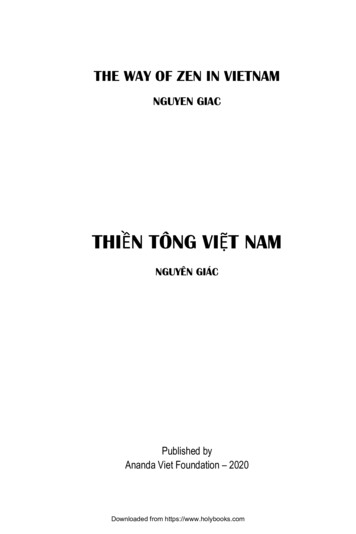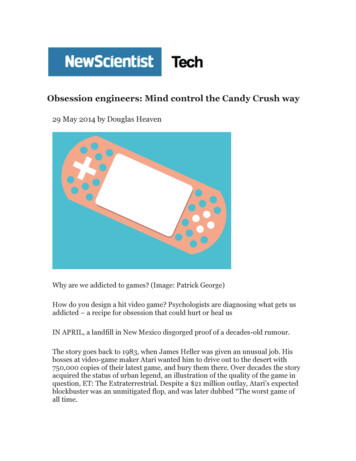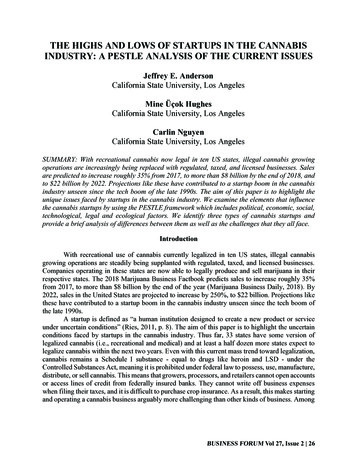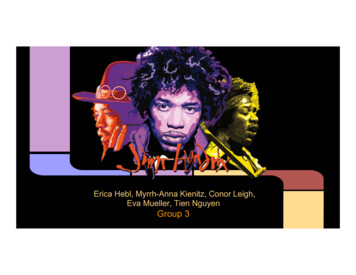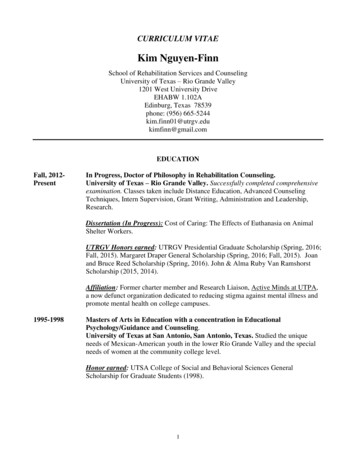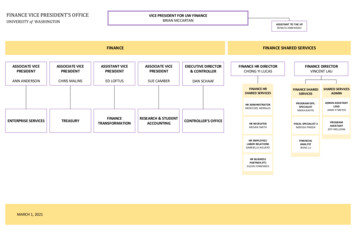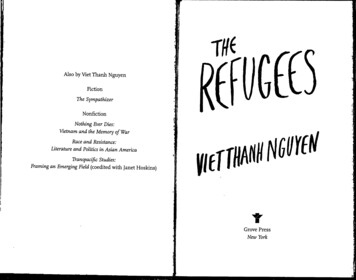
Transcription
Also by Viet Thanh NguyenFictionThe SympathizerNonfictionNothing Ever Dies:Vietnam and the Memory of WarRace and Resistance:Literature and Politics in Asian AmericaTranspacific Studies:Framing an Emerging Field (coedited with Janet Hoskins)Grove PressNew York
Copyright 2017 by Viet Thanh NguyenVersions of the stories coUected here were originaUy pubUshed in the Mowingpublications: “Black-Eyed Women,” in Epoch. 64.2; “The Other Man”(published as “A Correct Life”), in Best New American Voices 2007; “War Years,”(published as “The War Years”) in TriQuarteriy, 135/136; “The Transplant” '(published as “Arthur Arellano”), in Narrative, Spring 2010; “I’d Love Youto Want Me" (pubUshed as “The Other Woman”), in Gulf Coast, 20.1; “TheAmericans,” in the Chicago Tribune, December 2010; “Someone Else BesidesYou,” in Narrative. Winter 2008; “Fatherland," in Narrative, Spring 2011.For all refugees, everywhereAll rights reserved. No part of this book may be reproduced in any form orby any electronic or mechanical means, including information storageand retrieval systems, without permission in writing from the publisher,except by a reviewer, who may quote brief passages in a review. Scanning,uploading, and electronic distribution of this book or the faciUtation of'such without the permission of the publisher is prohibited. Please purchaseonly authorized electronic editions, and do not participate in or encourageelectronic piracy of copyrighted materials. Your support of the author’s rightsis appreciated. Any member of educational institutions wishing to photocopypart or all of the work for classroom use, or anthology, should send inquiries toGrove Atlantic, 154 West 14th Street, New York, NY 10011or permissions@groveatlantic.com.First Grove Atlantic hardcover edition: February 2017Published simultaneously in CanadaPrinted in the United States ofAmericaFIRST EDITIONISBN 978-0-8021-2639-9elSBN 978-0-8021-8935-6Library of Congress Cataloging-in-Publication data is available for this title.Grove Pressan imprint of Grove Atlantic154 West 14th StreetNew York, NY 10011Distributed by Publishers Group Westgroveatlantic.com17 18 19 2010 9 8 7 6 5 4 3 2 1
M ymO efore Mrs. Hoa broke into our lives in the summer ofQ 1983, nothing my mother did surprised me. Her routinewas as predictable as the rotation of the earth, beginning withhow she rapped on my door every morning, at six, six fifteen,and six thirty, until at last I was awake. When I emergedfrom my bedroom, she was already dressed, invariably wear ing a short-sleeved blouse and skirt of matching pastels. Sheowned seven such outfits, and if she had on fuchsia, I knew itwas Monday. Before we departed, she switched off the lights,checked the burners, tugged on the black iron grills guard ing our windows, always in that order, and then, in the car,ordered me to lock my door.As my father steered the Oldsmobile and I sat in the backreading a comic book, my mother worked on her makeup.By the time we arrived at St. Patrick ten minutes later, she4 ?fl»
mumuNct/mmmciiswas finished, the flags of blush on her cheeks blending inwith her foundation. Perfume was the last touch, a pumpof the spray on either side of her neck. The dizzying scentof gardenias clung to me in Ms. Korman’s summer schoolclassroom, where, for seven hours every day, I spoke onlyEnglish. I liked school, even summer school. It was like beingon vacation from home, and at three o’clock, I was always alittle disappointed to walk the four blocks to the grocery store“They’re just going to ask for a lower price.” I was thir teen, beginning to be brave enough to Say what I had sus pected for a while, that my mother wasn’t always right. “Whydo they haggle over everything? Why can’t they just pay themy parents ovmed, the New Saigon Market, where Englishwas hardly ever spoken and Vietnamese was loud.My mother and father rarely left their posts, the cashregisters flanking the entrance of the New Saigon. Custom ers always crowded the market, one of the few places in SanJose where the Vietnamese could buy the staples and spices ofhome, jasmine rice and star anise, fish sauce and fire-enginered chilies. People haggled endlessly with my mother overeverything, beginning with the rock sugar, which I pretendedwas yellow kryptonite, and ending with the varieties of meatin the freezer, from pork chops and catfish with a glint oflight in their eyes to shoestrings of chewy tripe and packetsof chicken hearts, small and tender as button mushrooms.price that’s there?”“Are you going to be the kind of person who always paysthe asking price?” my mother demanded. “Or the kind whofights to find out what something’s really worth?”I wasn’t sure. All I knew was that in the New Saigon, mychore every afternoon was to price the cans and packages. I wason my knees, rummaging for the stamp pad on the shelfbehindmy mother, when Mrs. Hoa introduced herself. Like my mother,she was in her late forties and dressed in monochrome, a whitejacket, white pants, and white shoes, with bug-eyed sunglassesobscuring her face. As my mother bagged her purchases, Mrs.Hoa said, “I’m collecting funds for the fight against the Com munists, my dear.” I knew the basics of our history as wellas I knew the story of Adam and Eve: the Communists hadmarched from North Vietnam in 1975 to invade South Viet nam, driving us out, all the way across the Pacific to Cafifomia.I had no memories of the war, but Mrs. Hoa said others had“Can’t we just sell TV dinners?” I asked once. It was easyto say TV dinners in Vietnamese since the word for televisionwas ti-vi, but there were no Vietnamese words for other thingsI wanted. “And what about bologna?”“What?” My mother’s brow furrowed. “If I can’t pro nounce it, my customers won’t buy it. Now go stamp theprices on those cans.”not forgotten. A guerrilla army of former South Vietnamesesoldiers was training in the jimgles of Thailand, preparing tolaunch a coimterattack in unified Vietnam. The plan was to stirthe unhappy people against their Communist rulers, incite arevolution, and resurrect the Republic of the South.“Our men need our support,” Mrs. Hoa said. “And weso51need good citizens like yourself to contribute.”
mjrmuNGi/mmmciisMy mother rubbed one ankle against the other, hernylons scratching. A seam had opened behind her knee, butmy mother wotdd keep wearing the same hose until the runnipped at her heels. “I wish I could help, Mrs. Hoa, but timesare hard,” my mother said. “Our customers are cutting backmosquito-bitten men with matted hair wearing ragged tigerstripe fatigues; living on rainwater, wild boar, and aphids;practicing hand-to-hand combat skills by bayoneting jack-on everything, what with the recession and the gas prices. Andour daughter’s in college. Her tuition is like a down paymenton a house every year.”I struggle making ends meet, too.” Mrs. Hoa unclaspedand clasped the silver latch on her purse. A thin gold bandencircled her ring finger, and the red enamel on her nails wasas polished and glossy as a new car’s paint. “But people talk.Did you hear about Mrs. Binh. People say she’s a Communistsympathizer, and all because she’s too cheap to give anything.There’s even talk of boycotting her store.”My mother knew Mrs. Binh, owner of Les Amis BeautySalon a few blocks farther west downtovm, but changed thetopic to the steamy June weather and the price of gold. Mrs.Hoa agreed about the temperature, smiling and displayinga formidable wall of teeth. She glanced at me before leavingmy mother with this: “Think about it, dear. Taking back ourhomeland is a noble cause for which we should all be proudto fight.”“Idiot,” my mother muttered after Mrs. Hoa was gone.As we drove home that evening along Tenth Street, my motherrecounted the episode to my father, who had been too busyat his own register to overhear the conversation. When shementioned the guerrillas, I imagined them to be unshaven,szfruit. From the backseat, I said, “How much are you givingMrs. Hoa. ”“Nothing,” she replied. “It’s extortion.”“But they’re fighting the Communists,” I said. Alsoknown as Chinese and North Koreans, with Cubans and Sandinistas threatening infiltration and invasion from south ofour border, as President Reagan explained on World NewsTonight. “Shouldn’t we help them?”“The war’s over.” My mother sounded tired. “There’s nofighting it again.”I was outraged, for Mrs. Hoa’s appearance proved thewar was not over, in that she had somehow followed us fromthe old Saigon to the new one. What was more, I had readNewsweek in the dentist’s office and knew we were in the midstof an epic battle against the evil empire of the Soviet Union.But if I was unhappy with my mother’s response, I was evenmore upset with my father’s.“The war may be over,” he said, wiggling his little fingerin his ear, “but paying a little hush money wordd make ourlives a lot easier.”My mother said nothing, merely drumming her fingerson the armrest. I knew she would have her way with my father,a bald man with the deliberate moves and patient eyes of aturtle. Late that night, hurrying from the kitchen to my roomwith a glass of water, I heard my mother working to persuadeS3
mjmuNci/mmmmhim behind their closed door. There was no time to eavesdrop.We had recently read “The Fall of the House of Usher” inbegan talking during our evening bookkeeping, a time whenshe was usually completely focused on calculating the dailyreceipts. We worked at the dining table, counting cash, rollingcoins into paper packages the size of firecrackers, and stamp ing the New Saigon’s address onto the back of the personalchecks, the Monopoly-money food stamps, and the yellow cou pons from Aid to Families with Dependent Children. WhenI added the sums with a humming mechanical calculatorbigger than our rotary telephone, I never needed to look atthe keypad. I knew every number’s place by heart. It wouldMs. Korman’s class, and the fear of seeing someone undeadin the dark hallway made me rush past their door, just as mymother said, “Tve dealt with worse than her.”Dread was stronger than curiosity. I shut my door andjumped into bed shivering, pushing aside my summer text books, which were wrapped in brown covers I had cut froma shopping bag and upon which I had scrawled “Math” and“American History.” Perhaps my mother was talking aboutthe famine at the end ofthe Second World War, when she wasnine. Last year, an evening television report on the Ethiopianfamine had prompted my mother to mention this other fam ine while I plucked the gray hairs from her head. “Do youknow a dozen children in my village starved to death. ” shesaid, even though I obviously did not know. “Older people, too,sometimes right on the street. One day I found a girl I usedto play with dead on her doorstep.” My mother lapsed intosilence as she stared at a point on the wall above the televi sion, and I did not say anything. It was the kind of story shetold all the time, and in any case, I was too distracted to askquestions. She was paying me for every strand I found andI was intent on my search, each gray hair bringing me onenickel closer to the next issue of Captain America.be the only time I was ever good at math.As we did the day’s reckoning, my mother reported onthe rumors of former South Vietnamese soldiers organizingnot only a guerrilla army in Thailand but also a secret fronthere in the United States, its purpose to overthrow the Commimists. Grimmer than rumors was how unknown assailantshad firebombed a Vietnamese newspaper editor’s office inGarden Grove (he died), while another editor had been shotto death, along with his wife, in the doorway oftheir house inVirginia (the murderers were never caught). “They just said inpublic what a lot of people already say in private,” my mothersaid, wetting her fingers on a sponge. “Making peace with theup Mrs. Hoa, but the woman had unsettled her. My motherCommimists might not be such a bad thing.”I wrote down figures in a ledger, never looking up. Myfather and I worked in T-shirts and shorts, but my motherwore only a nightgown of sheer green fabric without a bra.She wasn’t aware of how her breasts swayed like anemonesxmder shallow water, embarrassing me whenever I saw those5-455In the days and nights that passed, my mother never brought
mimmuci/mmmmdark and doleful areolas with their nipples as thick as myindex finger. My mother's breasts were nothing like those ofthe girls in my class, or so I imagined in fantasies that hadbeen confirmed the week before when I had seen EmmyTsuchida’s nipple through the gap between two buttons ofher shirt, pink and pert, exactly like the eraser on the pencilnot watched it even once, then the country in which he livedsurely needed a revolution. But my mother would not haveagreed. She wrapped a paper band around the twenties andsaid, “I hate the Communists as much as Mrs. Hoa, but she’sfighting a war that can’t be won. I’m not throwing away myin my hand. Without raising my gaze from the ledger, I said.But you always tell me the Communists are bad people.”“O-ho!" my father said with a chortle. “So you do pay at tention. Sometimes I can’t tell what’s going on behind thosethick glasses of yours.”“The Commimists are evil.” My mother riffled througha stack of twenty-dollar bills. She had never finished gradeschool, her father forcing her to stay at home to care for hersiblings, and yet she could count money by hand and addfigures in her head more quickly than I could on the calcula tor. “There’s no doubt about it. They don’t believe in God andthey don’t believe in money.”money on a lost cause.”My father ended the conversation by standing and sweep ing the cash, coins, checks, and food stamps into the vinylsatchel he carried every morning to the Bank of America.My parents kept some of their profits in the bank, donated aportion to the church, and wired another percentage to therelatives in Vietnam, who periodically mailed us thin lettersthick with trouble, summed up for me by my mother to thetime of no food and no money, no school and no hope. Theirquestion, but he must have seen Luke Skywalker crossinglight sabers with Darth Vader. I had seen Star Wars a dozenrelatives’ experiences and their own had taught my parents tobelieve that no country was immune to disaster, and,so theysecreted another percentage ofthe profits at home, just in casesome horrendous calamity wiped out the American bankingsystem. My mother wrapped blocks of hundred-dollar bills inplastic and taped them underneath the lid of the toilet tank,buried dog-tag-sized ounces of gold in the rice, and stashed herjade bracelets, twenty-four-karat gold necklaces, and diamondrings in a portable fireproof safe, hidden in the crawl space imdemeath the house. To distract thieves, she devised decoys, plac ing a large glass vase heavy with coins high on a bookshelf bythe front door, and a pair of gold bracelets on top of her dresser.Her fear of robbery was proved justified last October,times on videotape, and if anyone was so deprived as to havewhen, on an otherwise forgettable Tuesday evening, someones&57“But they believe in taking other people’s money,” myfather said. He spoke often of his auto parts store, which ac cording to his brothers no longer had any parts to sell imderCommunist ownership. We had lived above the store, andsometimes I wondered if a Communist child was sleepingin my bed, and if so, what kinds of books a Red read, andwhat kind of movies he saw. Captain America was out of the
mj Turn mmmmmknocked on the door. My father was in the kitchen, having justturned on the stove, and I reached the door a few steps ahead ofmy mother, already in her nightgown. When I peered throughthe peephole, I saw a white man who said, “I got mail for you,sir.” If he had spoken in Vietnamese or Spanish, I never wouldhave unlocked the door, but because he spoke English, I did.Pity overwhelmed me; I knew this was neither the first northe last time someone would humiliate them like this. As ifaware of my thoughts, the man pointed the gun at me word lessly, and I got down on my knees, too. Only my mother didnot sink to her knees, her back against the wall and her face,freshly peeled of makeup, very white. Her breasts und\ilatedHe used his left hand to push his way into the house, a youngman in his twenties v dth feathered hair the color of old straw,long enough to brush the collar of his frayed jeans jacket. Notmuch taller than my mother, he was slightly built; when hespoke, his voice squeaked like rubber soles on a gym floor.behind her nightgown, like the heads oftwin eels, as she keptsaying no. The man was still aiming his gun at me as he said,“Get back,” he said. His forehead was slick with sweat,and in his right hand was a gun. Even with the passage ofdecades, I can still see that gun clearly, a black-barreled .22revolver that he waved before him with a trembling hand ashe stepped past the threshold, kicking at the jumble of shoeswe kept there and forgetting to close the door. My motherconcluded later that he was an amateur, perhaps an addictdesperate for money. He pointed the gun past me, at her, andsaid, “You understand English? Get on the floor!”I backed away, while my mother threw her hands in theair, saying, Khong, khong, khongl” My father had appeared,halfway between the kitchen and the front door, and the manfixed his aim on him, saying, “Get down, mister.” My fathergot onto his knees, raising his hands high. “No shoot,” myfather said in English, his voice faint. “No shoot, please.”“What's her problem, kid?”When my mother screamed, the sound froze every one except her. She pushed past the man, nudging the gunaside with her hand and bxrmping him with her shoulder asshe ran outside. He stumbled against the bookshelf by thedoor, knocking over the glass vase full of coins. Falling to theground, it shattered, spraying pennies, nickels, and dimesall over, the coins mixed with shards of glass. “Jesus Christ!”the man said. When he turned toward the door, my fatherleaped up and hurled himself against the man’s back, shovinghim across the threshold and then slamming the door shut.Outside, the gun went off with a short, sharp little pop, thebullet ricocheting off the sidewalk and lodging itself in thewall next to the mailbox, where a policeman would dig it outa few hours later.I had never seen my father on his knees outside church,and I had never seen my mother tremble and shake with fear.On Sunday morning before we left for church, my motherused a dab of Brylcreem and a black Ace comb to slick myhair and part it down the middle. I was horrified at the wayS859
minmNci/mI looked, like Alfalfa from Unit Rascals, but I didn’t protest,just as I hadn't said anything to her after the police broughtmy mother back home from a neighbor’s house. “I savedour lives, you coward!” she yelled at my father, who smiledweakly at the police sergeant taking down our report whilewe sat at the dining table. To me, as she yanked my ear, shesaid, “What did I say about opening the door to strangers.?How come you never listen to me.?” When the police sergeantasked me to translate, I rubbed my ear and.said, “She’s justscared, officer.”The police never caught the man, and, after a whilethere was no more reason to mention him. Even so, I thoughtabout him every now and again, especially on Sunday morn ings during mass when I rose from kneeling. It was thenthat I remembered how I had gotten off my knees to see mymother dashing by the living room window, barefoot on thesidewalk before all the people in their cars, hands raised highm the air and wearing only her nightgown in the twilight,shouting something I could not hear. She had saved us, andwasn’t salvation always the message from our priest. FatherDinh.? According to my mother, he was already middle-agedwhen he led his flock, including my parents, from the northof Vietnam to the south in 1954, after the Communists hadkicked out the French and seized the northern half of thecountry. Fantastically, Father Dinh still had more hair thanmy father, a tuft of white thread that shone under the fightlUuminating the stained glass windows. His voice trembled&ommmswhen he said, “In the name of the Father, the Son, and theHoly Spirit,” and I could not help dozing in the hard-backedpew while he sermonized, remembering Emmy Tsuchida’snipple and looking forward only to the end of mass.It was in the crowd jostling for the exit that Mrs. Hoatouched my mother’s elbow one Sunday, a few weeks after thebreak-in. “Didn’t you enjoy the father’s sermon?” Mrs. Hoasaid. Her eyes were curiously flat, as if painted onto her face.My mother’s back stiffened, and she barely turned her headto say, “I liked it very much.”“I haven’t heard from you yet about your donation, dear.Next week, perhaps.? I’ll come by.” Mrs. Hoa was dressedformally, in an ao dai of midnight velvet embroidered with agolden lotus over the breast. It must have been unbearablyhot in summer weather, but no perspiration showed on hertemples. “Meanwhile, here’s something to read.”She produced a sheet of paper from her purse, the samefake alligator skin one with the silver clasp I’d seen last week,and offered it to me. The mimeograph was in Vietnamese,which I could not read, but the blurry photograph said itall, gaunt men standing at attention in rank and file underfronds of palm trees, wearing exactly the tiger-stripe fatiguesI’d imagined.“What a handsome boy.” Mrs. Hoa’s tone was uncon vincing. She wore the same white high heels I’d seen before.“And you said your daughter’s in college.?”“On the East Coast.”
mimmNcymmmciisHarvard? Yale?” Those were the only two East Coastschools the Vietnamese knew. My mother, who could notthe Datsun was the Virgin Mary, her image reflected in thewindshield from her picture on the dash, as dim as our hand ful of fading color photos from Vietnam. My favorite featureda smiling young couple sitting on a grassy slope in front of apink country church, Ba in his sunglasses as he embraced Ma,who wore a peach ao dai over silk cream pants, her abundantpronounce Bryn Mawr, said, “Another one.”“What’s she studying? Law? Medicine?”My mother looked down in shame when she said, “Phi losophy.” She had scolded my sister Loan during her Christ mas vacation, telling her she was wasting her education. Myfather had agreed, saying, “Everyone needs a doctor or a law yer, but who needs a philosopher? We can get advice for freefrom the priest.”Mrs. Hoa smiled once more and said, “Excellent!” Aftershe was gone, I handed the mimeograph to my mother, whoshoved it into her purse. In the parking lot, crammed withcars and people, my mother pinched my father and said, “I’mfollowing Mrs. Hoa. You and Long run the market by your selves for a few hours.”My father grimaced and rubbed his hand over his head.“And what, exactly, are you planning to do?”She knows where we work. I’ll bet she knows where welive. If s only fair I know the same things, isn’t it?”hair whipped into a bouffant.“Nam XU,” my mother said, turning left onto Story Road.Thinking she wanted a translation into English, I said, “Anickel?”“Five cents is my profit on a can of soup.” As my motherdrove, she kept her foot on the brake, not the accelerator. Myhead botmeed back and forth on the headrest like a ball teth ered to a paddle. “Ten cents for a pound of pork, twenty-fivecents for ten pounds of rice. That woman wants five hundreddollars from me, but you see how we fight for each penny?”“Uh-huh,” I said, beads of sweat trickling from my armpit. Looking back so many decades later, I wonder if she waswas an excuse not to spend my morning at the New Saigon.My mother and I followed her in our Oldsmobile, headingsouth. Mrs. Hoa drove a small Datsun sedan the color of anegg yolk, peppered with flakes of rust. Superimposed uponexaggerating or if I am now, my memory attempting to ap proximate what our lives felt like. But I am certain that whenI rolled down the window and flung out my hand to surf thebreeze, my mother said, “A bus might come along and ripyour arm off” I pulled my arm back in and sighed. I yearnedfor the woman she once was in that old photograph, whenmy sister and I were not yet born and the war was nowhereto be seen, when my mother and father owned the future.Sometimes I tried to imagine what she looked like when shewas even younger, at nine, and I could not. Without a photo.6263“Okay.” My father sighed. “Let’s go, son.”“I want to go with Ma.”“You, too?” my father muttered.I was curious about Mrs. Hoa, and helping my mother
mimmNcummy mother as a little girl no longer existed anywhere, perhapsnot even in her own mind. More than all those people starvedby famine, it was the thought of my mother not rememberingwhat she looked like as a little girl that saddened me.Mrs. Hoa turned off Story Road onto a side street, aneighborhood of one-story homes with windows too smallfor the walls. Well-worn Ford pickups and Chrysler lowriders with chrome rims were parked on the lawns. The frontyard of Mrs. Hoa’s house was paved over, and her yellowDatsun joined a white Toyota Corolla with a crushed bumperand a green Honda Civic missing a hubcap. After Mrs. Hoawalked inside, my mother cruised forward to inspect thehouse, painted with a newish coat of cheap, bright turquoise,the garage transformed into a storefront with sliding glassdoors and a red neon sign that said nha may. The blindson the tailor shop’s windows and the curtains of the livingroom were drawn, showing their white backs. The man whohad invaded our house must have followed us home in thesame way, but my mother did not seem to recognize this.Instead, her voice was full of satisfaction when she spoke.“Now,” she said, easing her foot off the brake, “we knowwhere she lives.”When Mrs. Hoa came to the New Saigon on Wednesday af ternoon of the following week, I was in the wooden loft myfather had hammered together above the kitchenware at the64mmmrear of the store. We stored enough long-grain rice in the loftto feed a village, stacked nearly to the ceiling in burlap sacksof ten, twenty-five, and fifty pounds. The clean carpet scentof jasmine rice permeated the air as I sat astride a dike officesacks, reading about Reconstruction. I had reached the partabout the scalawags and carpetbaggers who had come fromthe North to help rebuild, or perhaps swindle, the South,when I saw Mrs. Hoa at the doorway, wearing the white outfitfrom her first visit.By the way my mother gripped the sides of the cashregister as if it were a canoe rocking in the waves while Mrs.Hoa talked to her, I knew there would be trouble. I climbeddown the ladder, made my way past aisles stocked with con densed milk and cellophane noodles, shrimp chips and driedcuttlefish, lychees and green mangoes, ducking my head toavoid the yellow strips of sticky flypaper dangling from theceiling, and reached the front of the store as my mother wassaying, “I’m not giving you any money.” A crack showed in herfoundation, a line creasing her cheek from nose to jawbone.“I work hard for my money. What do you do.!* You’re nothingbut a thief and an extortionist, making people think they canstill fight this war.”I stood behind a row of customers, one of them read ing the same mimeograph Mrs. Hoa gave me in church.Mrs. Hoa’s face had turned as white as her outfit, and redlipstick smeared her ochre teeth, bared in fury. She glaredat the customers and said, “You heard her, didn’t you.!* she&s
minmNci/mruamasdoesn’t support the cause. If she’s not a Communist, she’sjust as bad as a Communist. If you shop here, you’re help ing Communists.”and when we reached our house, he went wordlessly inside toMrs. Hoa slammed a stack of mimeographs onto thecounter by the register, and with that, she left. My motherstared at my father at the register across from her, and neithersaid a word as the Datsun sputtered into life outside. Thewon’t do anything crazy with you there.”It was eight thirty when my mother parked the car inMrs. Hoa’s driveway, behind the Datsun. Mrs. Hoa answeredcustomers in front of me shifted uneasily. Within an hour,they would be on their telephones, all telling their friends,who in turn would tell their fiiends, who then would tell morepeople, until everyone in the community knew. My motherturned to the customers with her face as carefully composedas the letters she sent to her relatives, showing no signs ofworry, and said, “Who’s next.?”Throughout the rest ofthe day, my mother made no men tion of Mrs. Hoa, and I thought that she woixld simply ignoreher, hoping she would not return. But the moment we got intothe car, my mother began talking about her counterattack, andI realized that she had been simmering for hours, keepingquiet for the sake of the customers. My mother would go toMrs. Hoa and demand an apology, for her accusation couldcost my mother her reputation and her business, given thedepth of anti-Communist fervor in our Vietnamese commu nity. My mother would call Mrs. Hoa a disgrace and slap herif she refused. My mother would point out the hopelessnessand self-delusion of Mrs. Hoa’s cause, reducing her to tearswith logic. As my mother rehearsed her plans, my father saidnothing, and neither did I. We knew better than to oppose her.start dinner, as instructed. My mother drove on to Mrs. Hoa shouse, taking me with her because, she said, “That womanthe door wearing an orange tank top and a pair of shorts in apurple floral print. Her hair was pinned back in a bun and herface, bereft of mascara, lipstick, or foundation was creviced,pitted, and cracked—it belonged to a woman years older. Hersmall breasts were no bigger than those of Emmy Tsuchida,and a map of varicose veins on her skinny thighs and shinsled south to gnarled toes, the yellowing nails spotted with reddabs of chipped polish.“What are you doing here?" Mrs. Hoa said.“I want to speak to you,” my mother said. “Aren’t yougoing to invite us in?”Mrs. Hoa hesitated and then stepped back begrudgingly.We took off our shoes and picked our way past th
No part ofthis book may be reproduced in any form or by any electronic or mechanical means, including information storage and retrieval systems, without permission in writing from the publisher, except by a reviewer, who may quote briefpassages in a review. Scanning, uploading, and electronic distrib
